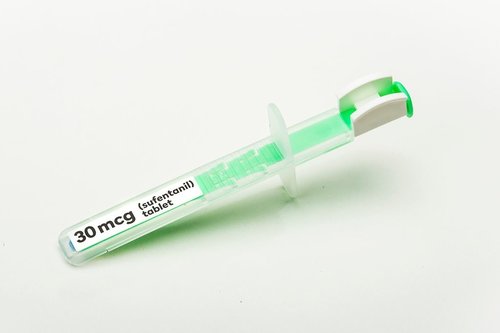Opioid Promotion Cited in FDA Warning Was Stopped in 2019
/By Pat Anson, PNN Editor
A California pharmaceutical company that received a warning letter from the Food and Drug Administration over its promotion of a controversial opioid painkiller stopped using the marketing material over a year ago.
The FDA sent the warning letter to AcelRx Pharmaceuticals last week. The agency told the company to stop making “false and misleading claims” about Dsuvia, a potent opioid tablet used to relieve acute pain in hospital settings.
The “Tongue and Done” banner ads and tabletop displays emphasized how easy Dsuvia is to administer by using a plastic applicator that releases a single tablet directly into a patient’s mouth. The FDA said the promotions were misleading and dangerous.
“AcelRx has disseminated promotional communications that undermine key prescribing conditions required for the safe use of this opioid product. Dsuvia was approved with special restrictions requiring that it only be prescribed in a certified medically supervised setting by health care practitioners trained to properly administer it,” the FDA said in a statement.
“This promotion dangerously undercuts FDA-required conditions on the proper administration of the drug, which requires particular diligence to minimize the risk of serious or even fatal adverse events.”
The letter warns AcelRx to either stop using the marketing material or cease distributing Dsuvia. It gave the company 15 days to respond or face “further regulatory action.”
ACELRX PROMOTION
But in a filing with the Securities and Exchange Commission, AcelRx said it could “easily address” the FDA’s concerns because it stopped using the “Tongue and Done” promotions in late 2019.
“The Company intends to respond to the FDA within the timeframe requested in the Letter and seek guidance and clarification from the FDA on the concerns raised in the Letter,” the SEC filing states. “The Company cannot give any assurances, however, that the FDA will be satisfied with its response to the Letter or that such response will resolve the issues identified in the Letter.”
Few Adverse Events Involve Dsuvia
The FDA approved the use of Dsuvia in 2018 over the objections of anti-opioid activists who said it was a “dangerously unnecessary opioid medication" that would be diverted, abused and lead to more overdoses. There is little evidence any of that has occurred.
Dsuvia contains sufentanil, an opioid 10 times stronger than fentanyl. It was developed to fulfill an unmet need in military and civilian hospitals, where patients need quick relief from acute trauma pain and can’t wait for opioids to be administered intravenously. Each Dsuvia tablet comes in a single dose applicator. The tablets quickly dissolve under the tongue and are not available for home use.
Those safety measures appear to be working. The FDA’s Adverse Events Reporting System lists only six cases involving Dsuvia in 2019 and 2020. There were no deaths and none of the cases were considered serious.
AcelRx recently published the results of a clinical study that showed surgery patients treated with Dsuvia used significantly fewer opioids than those treated with traditional IV opioids. They were also discharged sooner.
The FDA’s belated warning letter to AcelRx about its Dsuvia marketing comes as the agency faces renewed scrutiny for its regulation of opioids.
Acting FDA Commissioner Dr. Janet Woodcock is reportedly under consideration by President Biden for a formal nomination to the job, which has drawn the ire of some anti-opioid activists. A letter sent to the Acting Secretary of Health and Human Services accuses Woodcock of “dereliction of duty” for failing to address the opioid crisis by halting the approval of new opioids. Woodcock has been Director of the FDA’s Center for Drug Evaluation and Research for over 25 years.







